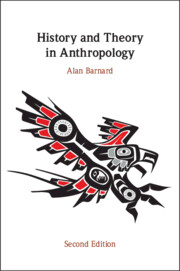Book contents
- History and Theory in Anthropology
- History and Theory in Anthropology
- Copyright page
- Dedication
- Contents
- Figures
- Tables
- Preface
- 1 Visions of Anthropology
- 2 Precursors of the Anthropological Tradition
- 3 Changing Perspectives on Evolution
- 4 Diffusionist and Culture-Area Theories
- 5 Functionalism and Structural-Functionalism
- 6 Action and Process
- 7 Marxist Perspectives
- 8 From Relativism to Cognitive Science
- 9 Structuralism, from Linguistics to Anthropology
- 10 Poststructuralists and Feminists
- 11 Mavericks
- 12 Interpretive Approaches
- 13 Postmodernism and Its Aftermath
- 14 Conclusions
- Book part
- References
- Index
8 - From Relativism to Cognitive Science
Published online by Cambridge University Press: 09 December 2021
- History and Theory in Anthropology
- History and Theory in Anthropology
- Copyright page
- Dedication
- Contents
- Figures
- Tables
- Preface
- 1 Visions of Anthropology
- 2 Precursors of the Anthropological Tradition
- 3 Changing Perspectives on Evolution
- 4 Diffusionist and Culture-Area Theories
- 5 Functionalism and Structural-Functionalism
- 6 Action and Process
- 7 Marxist Perspectives
- 8 From Relativism to Cognitive Science
- 9 Structuralism, from Linguistics to Anthropology
- 10 Poststructuralists and Feminists
- 11 Mavericks
- 12 Interpretive Approaches
- 13 Postmodernism and Its Aftermath
- 14 Conclusions
- Book part
- References
- Index
Summary
The next debate to emerge concerned the idea of relativism. This was central to the Boasian vision of anthropology. Franz Boas believed that no culture is superior to any other, and his anthropology emphasized this. This idea was taken up by his students, including Ruth Benedict and Margaret Mead. Opposing this we have Lucien Lévy-Bruhl, who believed that some cultures are superior to others. Another key figure was Benjamin Lee Whorf. His linguistic relativism sought to explain that languages classify differently. This is also apparent in kinship, where different categorizations might imply different ways of thinking.
Keywords
Information
- Type
- Chapter
- Information
- History and Theory in Anthropology , pp. 103 - 124Publisher: Cambridge University PressPrint publication year: 2021
